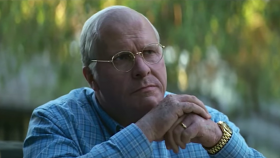
I was most definitely in the minority on writer/director Adam McKay’s last movie, The Big Short. I found it to be overly ambitious and bizarre, but most of the world loved it, including the Academy, which nominated it for Best Picture, Best Supporting Actor, Best Directing and Best Adapted Screenplay, which it won. McKay’s latest effort, Vice, is no less ambitious, but I have a weird feeling the Academy won’t embrace it the way it did its predecessor.

Like The Big Short, Vice takes on a big subject in our modern world and looks at it through a cynical and somewhat satirical lens. McKay likes to revel in irreverence, skewering people in power who make decisions that affect everyone and assailing their motivations. The Big Short was a study in cause and effect—motivation (greed) was clear and the result of actions (economic collapse) was played out. However, in Vice, McKay takes a somewhat different approach to his subject, as not only are the motivations of his subject unclear, but the effects of those motivations are reduced to a sidebar. It’s a weird dynamic, but, somehow, still works.
Vice is intended to be a portrait of modern America as seen through one man’s biography. That man is former Vice President Dick Cheney, whose notoriety is only matched by his invisibility. Everybody knows Cheney, but nobody seems to really know Cheney. As the prototypical political backroom puppeteer, Cheney has been known to liberals as the root of all current evils, and Vice attempts to unveil to the world who Cheney really is and why he did the things he did.
It doesn’t.
I found myself to be just as ignorant as to who Dick Cheney was and what motivated him at the end of this movie as I was going in. I knew more about his life and his career, but I knew no more about who he was as a person. And there’s some strange poetry in that. What makes us think we could ever truly get to know a man like this, a political ghost who lingers in every room far after he has left it. What we do know about Cheney are the things he did, the people he influenced (controlled?) and the long-lasting effects of those actions and influences. And, for Vice, that seems to be enough.
I’ll be honest, though. I really don’t know how much detail and insight there actually is in Vice because I was too distracted by Christian Bale’s performance to really pay attention to anything else. To say Bale transforms into Cheney is not only an understatement, it is a disservice to the magnitude of this performance. Like Daniel Day-Lewis in Lincoln and Sean Penn in Milk, this performance is a staggering achievement in film acting that deserves to be seen and appreciated for decades to come. The difference here is that his subject is still alive and so many people have their own vivid recollections of the man that they can use to compare to Bale’s portrayal. I found myself so transfixed by his transformation and mastery of every little tic and movement that I felt occasionally hypnotized. I was stunned and amused, wowed and baffled as to how he did it. We all know how talented Christian Bale is, but this is so good it’s stupid.
And it’s not just Bale that sets the screen on fire in Vice. Amy Adams, Steve Carell and Sam Rockwell are also at the absolute top of their games here as well. A hallmark of Adam McKay movies is an ensemble of actors, each of whom nail anything they are asked to do, no matter how small a role. Vice is no exception.
But let’s all stop kidding ourselves. Vice is Christian Bale. There’s no reason to see this movie other than his performance. I was really hoping to get more out of the movie, as far as an explanation or an understanding to what made one of the most influential people in politics in the last century tick, but what I got—happily—was a performance for the ages. Dick Cheney may always be a mystery, but Christian Bale is the answer to every acting question.
